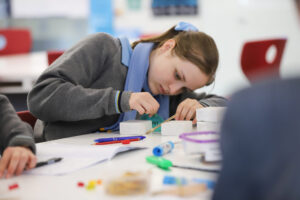The Critical Conversation

Since 2022, Year 9 Humanities learning and teaching has been transformed through the implementation of St Catherine’s Critical Conversations Program.
Utilising the Harkness-approach, a dynamic method that fosters critical thinking and collaborative discussion among students, the Critical Conversations Program is the culmination of a carefully curated sequence of learning experiences that deepens student knowledge and thinking.
St Catherine’s student Emily Cameron, participated in the School’s first Critical Conversations Program in 2022. Now in Year 11, Emily can see the benefits the Program provided in preparing her for VCE. “Critical Conversations helped me to build the confidence to participate in class conversations and share my ideas with my peers, as previously this was something that I struggled with. Critical Conversations has also helped me stay engaged with class content and is an interesting and expressive way of learning.”
The approach is now well established in Year 9 Humanities and in 2024, we are expanding its practice into Year 10 Humanities electives as well as into other Faculty areas of the School. In 2023, the Arts Faculty successfully adapted the Harkness-approach with its Year 12 Art Creative Practice subject. Year 10 English students are also using critical conversations in their study of texts and authors.
What is the Harkness approach at St Catherine’s?
The Harkness-approach embodies a pedagogy that promotes student centred learning and active participation. Originating from the Harkness Table discussions at Phillips Exeter Academy in the USA, this methodology emphasises students engaging in collaborative inquiry and the exploration of various perspectives.
How does the Critical Conversations Program fit within traditional subjects?
 In preparation for the Critical Conversation, students receive foundational knowledge from their teacher, along with supporting resources. From this the students immerse themselves in the subject matter, synthesise information and develop their analytical skills. Guided by teachers, they engage in thinking routines and utilise subject-specific frameworks to refine their ideas. During the Critical Conversation itself, students take centre stage, engaging in a dialogue that spans 30 to 40 minutes. This unscripted exchange encourages active participation and cultivates essential oracy skills.
In preparation for the Critical Conversation, students receive foundational knowledge from their teacher, along with supporting resources. From this the students immerse themselves in the subject matter, synthesise information and develop their analytical skills. Guided by teachers, they engage in thinking routines and utilise subject-specific frameworks to refine their ideas. During the Critical Conversation itself, students take centre stage, engaging in a dialogue that spans 30 to 40 minutes. This unscripted exchange encourages active participation and cultivates essential oracy skills.
What do teachers do during the Critical Conversations?
Teachers play a multifaceted role in the Program, serving as mentors, facilitators, and evaluators. Prior to the Critical Conversation, teachers guide students through the preparatory phase, providing feedback and guidance as they navigate complex concepts. During the conversation, teachers observe the dynamics unfolding, mapping the student discussion, while refraining from direct intervention. Post-conversation, teachers assess students with rubrics, evaluating both the substance of students’ contributions and their overall engagement throughout the learning process.
The Critical Conversation: A Transformative Experience
 The Critical Conversation Program offers students a platform to articulate their perspectives and engage in meaningful dialogue. While initially challenging, with moments of silence and uncertainty, the conversation gradually gains momentum as students embrace the opportunity to express themselves. Beyond academic achievement, the Program fosters skills essential for lifelong learning, including critical thinking, effective communication, and collaborative problem-solving.
The Critical Conversation Program offers students a platform to articulate their perspectives and engage in meaningful dialogue. While initially challenging, with moments of silence and uncertainty, the conversation gradually gains momentum as students embrace the opportunity to express themselves. Beyond academic achievement, the Program fosters skills essential for lifelong learning, including critical thinking, effective communication, and collaborative problem-solving.
Student Feedback
“Being in an open forum environment allowed me to express my views on the topics we were learning more freely, which in turn allowed others to speak up as well, creating interesting classroom discussions on what we were learning. Now that I am in Year 11, I feel that from this experience I have gained more confidence in speaking in class which allows more student-led conversations and enables independence in our learning. In the future, I feel that this style of learning will carry through to my years in university and beyond.” Heidi Axup
“The Critical Conversations implemented into the Year 9 Humanities curriculum were a valuable addition to the School’s curriculum, giving students insight on the style of learning in university classrooms. I personally found these conversations helped me further increase my skills in leadership, as you are challenged to actively include those in the discussion.
As a leading girl’s school, this idea of ‘inspiring inclusion,’ conveniently the theme for this year’s International Women’s Day, is vital to our learning. Ensuring that everyone is heard in a conversation has prepared me for interactions outside of School and given me the necessary skills when looking for a part-time job.
This style of learning has opened the door to new conversations and ideas, whilst simultaneously allowing those, who would normally not raise their hand in class, to share their thoughts. I also think that for those of us who are typically the most talkative have learned the importance of listening to everyone and I have personally gained the understanding that everyone’s views are valuable and should be heard. Overall, I view this model as highly effective and unique in its ability to teach real world skills in a classroom setting.” Rachel Carton
“In 2022, I studied Year 9 Humanities. Our School introduced the new concept of Critical Conversations, which involves students discussing the contents of the class and contributing their own ideas. This was done around an oval table, so everyone felt included. I honestly really enjoyed these discussions, and they were definitely my personal highlight of the subject, as it was a really new experience, different from traditional teaching. It felt more interactive and fun, and it gave students the opportunity not only to know the subject topic better but also each other. Overall, I think this is a great way of teaching and I know that it was not just me that really enjoyed these.” Celina Wang


